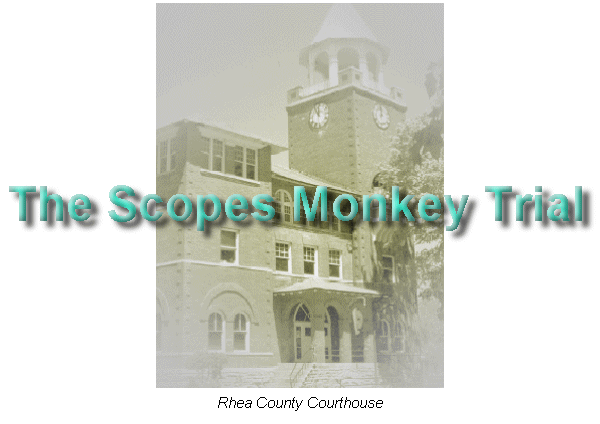Why was the Scopes Trial called the "Monkey" Trial?
A question asked by many visitors to this site goes something like: 'Why was the Scopes trial called "The Monkey Trial"?' Which is a good question to ask, because the answers give us some idea how people thought about the whole subject of evolution in the 1920s.
There are three pieces of information which, when put together, provide what I think is the most likely answer to the question:
First answer: It seems very likely that the title was actually invented by reporter H.L. Mencken, who used the name in his own reports on the trial. Whether he intended it simply as an eye-catching nickname, an insult aimed at the people who disagreed with his own opinion, or some other reason lay behind it is not clear.
And in any case, why would Mencken think of "monkeys" when making up a title for the trial?
Second answer: When the Bulter Act referred to "a lower order of animals" what it almost certainly meant was "monkeys". In 1925, in the mind of most members of the general public, the question of where human beings came from was a straight choice between having been created by God more or less as we are now, or being descended from some kind of monkey. As William Jennings Bryan put it on the afternoon of Day 5 (July 16th), quoting from Darwin's book The Descent of Man:
"'The Simiadae then branched off into two great stems, the new world and the old world monkeys, and from the latter, at a remote period, man, the wonder and glory of the universe, proceeded.'"
"Not even from American monkeys," [Bryan added] "but from old world monkeys". (Laughter.)
(From the trial transcript)
Third answer: Although this refers to something that happened during the trial, after the name "monkey trial" had come into use, it does tell us something about the way people in Tennessee (and in America, and all the countries where Darwin's theory was common knowledge), thought about evolution.
This link in people's minds was clearly expressed by the Chief prosecutor - Tom Stewart. At one point in the trial, the defense lawyers tried to argue that Scopes had not been properly indicted because there was no clear indication as to how he had broken the law. Stewart replied:
"The indictment complies with the wording of the statute in toto. If the statute is good, then the indictment must be good. Now, if Your Honor please, they say it is too vague; he does not know what he is charged with. We must set out in our indictment that he taught Little Johnnie Jones that a man is descended from a monkey, a gorilla, or what not, and told him this in the following words, to-wit: It is not necessary that we state all that; it is sufficient under our law that he may know what he is charged to answer."
(Scopes Trial, court transcript)
And as Scopes himself recalled in his autobiography, just over forty years after the trial, one of his favourite teachers at the University of Kentucky - Arthur McQuinston Miller:
"... had a nickname: "Monkey" Miller, because he taught evolution ..."
(Center of the Storm, Scopes and Presley, 1967. p.29)

